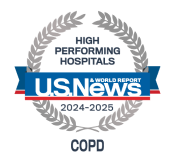Chronic Obstructive Pulmonary Disease - COPD

COPD, or chronic obstructive pulmonary disease, is a blockage of your airways that is irreversible, yet preventable and treatable. COPD makes breathing harder, resulting in shortness of breath and fatigue.
A group of lung diseases, COPD includes emphysema, which damages the lungs’ air sacs, and bronchitis, inflammation of the bronchial tubes, which let air in and out of your lungs. Bronchitis also includes coughing and phlegm production.
Previously, chronic obstructive pulmonary disease was thought to affect only men, but it affects women too. In 2017, COPD was the third leading cause of death for women, who are often diagnosed when COPD is more advanced and harder to treat.
Women who smoke are at higher risk, and develop COPD younger than men who smoke.
At the University of Maryland Medical Center Midtown Campus, you’ll have the most advanced COPD treatments. We also consider other diseases that are side effects of COPD, such as:
- Heart disease
- High blood pressure in your lungs' and heart's arteries (pulmonary hypertension)
- Lung cancer
- Osteoporosis
- Sleep disorders
- Vascular disease
COPD Symptoms
At first, you may have no symptoms or only mild symptoms. As COPD gets worse, your symptoms may become more severe and include:
- Frequent coughing or wheezing
- Excess phlegm, mucus or sputum production
- Shortness of breath with any activity
- Trouble taking a deep breath
COPD Causes
Tobacco smoke is a key risk factor in the U.S. for chronic obstructive pulmonary disease. Other risk factors include:
- Air pollutants in the home and workplace
- Genetic factors
- Respiratory infections
- Smoke from wood stoves, fireplaces and campfires
COPD Diagnosis
Depending on your condition, you may have one or more tests to diagnose chronic obstructive pulmonary disease, including:
- Chest X-ray or CT scan to visualize your lungs
- Pulmonary (lung) function tests and spirometry to measure your breathing capacity and how much air you can hold in and expel from your lungs
- Lab testing with arterial blood gas, where blood is taken from your wrist to determine how well your lungs transfer oxygen into your blood stream and remove carbon dioxide
- Bronchoscopy to view the airways and lungs
COPD Treatment
The best treatment for COPD is prevention. Because tobacco is the primary risk factor, if you smoke and don’t yet have COPD, quit. If you don’t smoke, don’t start. For those who wish to quit smoking, we offer smoking cessation help.
Other COPD treatments include:
- Anti-inflammatory medications, including steroids, to reduce airway swelling and mucus
- Bronchodilator medication to relax your airway muscles
- Inhaled corticosteroids that expand your bronchial tubes
- Medication to manage symptoms such as coughing and wheezing
- Oxygen therapy to help you maintain a more active lifestyle
- Lung volume reduction is available to certain candidates
- Lung transplant: Although there is no cure for COPD, a lung transplant can prolong life expectancy for people with advanced chronic obstructive pulmonary disease. We offer the latest technologies and therapies that are a bridge to transplant, including:
- ECMO, or extracorporeal membrane oxygenation, helps remove carbon dioxide from your lungs. We may use ECMO to allow your body to recover enough for you to have a lung transplant.
- EVLP (ex vivo lung perfusion) helps repair donor lungs to make them acceptable for transplantation.
- Hemolung® is an advanced catheter-based device used in place of a ventilator to clear carbon dioxide from your lungs.
Make an Appointment
Learn more about chronic obstructive pulmonary disease or make an appointment with one of our COPD specialists. Call 410-328-8141.


